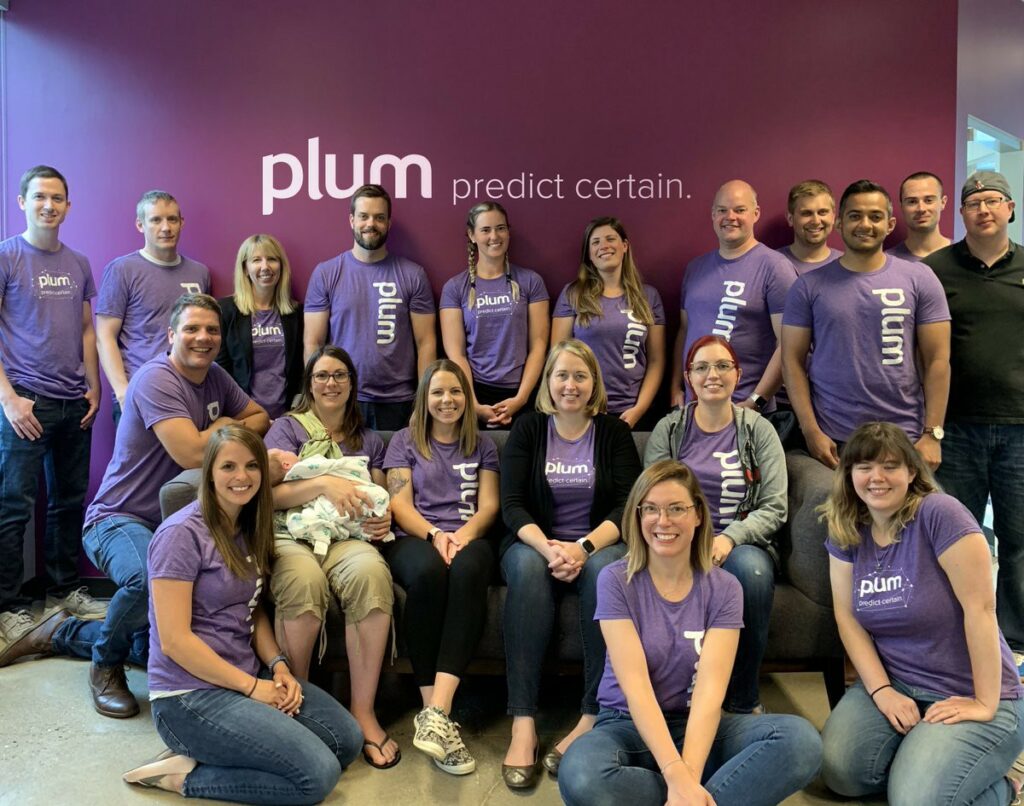In my role on the advisory boards of several start-ups, I find myself fascinated by what causes people to launch a company. Where does that passion come from, and how do they think they are going to change the world?
Wanting to know more, I took a deeper dive with Caitlin MacGregor, CEO and co-founder of Plum, a Canada-based company that combines AI with Industrial/Organizational Psychology to help companies make predictive talent decisions, from hiring through every stage of the employee journey.
Knowing you’re on the right track.
I asked Caitlin what (besides over $6M in seed money it has attracted) tells her the company is on the right track? “At a conference a few months back,” she began, “someone shared a story about vetting a company selling a resume-screening tool. After auditing the algorithm, the buyer found the AI predicted ‘top performer’ using two factors: their name was Jared, and they played high school lacrosse.” This kind of biased decision-making, as well as attracting major partners such as SAP SuccessFactors, has confirmed to Caitlin she is filling a real need.
Her assessment is seconded by Janet Bannister, partner at Venture Capitalist firm Real Ventures who notes, “McKinsey claims that 400 to 800 million jobs will disappear due to automation in the next 15 years. At the same time, 85% of jobs that will exist in 2030 do not exist today. We believe Plum is posed to make a significant, positive impact on millions of lives.”
What got you started?
Going back to the beginning of her journey, Caitlin says, “When I was gearing up to make my first hire [at a prior company building out its first U.S. branch], my executive coach warned me the cost of making the wrong hire at this early stage could result in the loss of tens of thousands of dollars.” For such a critical decision, she didn’t want to rely on the guesswork and gut instinct that often goes into hiring decisions. She started doing research on psychometric assessments, which quantify cognitive ability and personality, providing a behind-the-scenes look at someone’s behaviors and priorities.
“As I began digging into the science, I was shocked,” she confides. “I knew the traditional practice of screening resumes for the right education and experience was flawed, but it had never occurred to me just how much bias was being introduced. By putting so much focus on where someone went to school or previously worked the outcome is pattern-matching, just putting people where they ‘fit the mold’ of what a traditional candidate looks like.”
Industrial/Organizational Psychology had already proven that this method doesn’t work. Psychometrics, on the other hand, opened the opportunity to place people into roles based on their potential. “Once I introduced psychometrics into my hiring process, I suddenly began to find amazing talent that I would have otherwise overlooked based on resume alone.”
How are you filling a need?
Caitlin found that the only way to access psychometric data was to pay large consulting fees. This costly, arduous, and unscalable process meant most organizations didn’t collect psychometric data at all, or in a limited capacity and only for top-level hires. Says Caitlin, “I wanted to make it my mission to democratize and automate access to highly predictive psychometric data.”

Why you?
Caitlin was voted “most likely to save the world” in high school, leading her to study international development. After building two businesses for other people, she co-founded Plum with her husband Neil. (She is also a huge advocate for co-founding a company with one’s spouse, noting it provides a natural support system that eases the challenges of entrepreneurship.)
Her biggest role model was her mother who Caitlin says, “never stopped growing as a person.” Caitlin was inspired, seeing her mother get better and better as she learned and developed, and took to heart her mother’s constant support and care for others, which has informed Caitlin’s supportive leadership style.
Helping women?
Caitlin is an advocate for women in tech leadership, speaking regularly at women leadership events and involved in #movethedial, an initiative dedicated to increasing the leadership of women in tech. She notes, “At Plum, we have experienced firsthand the value of hiring for potential over past performance. 50% of Plum’s employees are women — a group that high tech companies especially tend to exclude. Of those women, almost all of them come from backgrounds that aren’t technology. Very little on their resumes indicated they would be a good fit, yet we were able to dig beneath the surface to unlock their potential — and now these women are thriving in their careers.”
What would you tell your younger self to do differently in your journey?
Says Caitlin, “There’s this motto that hikers on the Appalachian trail use: hike your own hike. I believe this concept can be applied to entrepreneurship, too. When you’re building a business, it can feel like you’re failing because all you notice is others doing it faster and better. Comparison isn’t how you become successful. In fact, it’s probably your biggest hurdle to success, because it distracts you from investing in your foundation and your people.”
What’s next?
Plum aims to expand its ability to equip HR/talent experts in not only hiring decisions but add predictive decisions at every stage of the employee lifecycle — including internal mobility, learning and development, strategic workforce planning, and emerging leader identification. Caitlin notes 75% of the workforce will be millennials by the year 2030. “Right now, this is a whole generation rarely being considered in succession plans. Since millennials will be the dominant generation in the workforce in just a few years, organizations that can identify high-potential people across their workforce now will have a competitive advantage in the future of work.”
Originally published on Medium.

